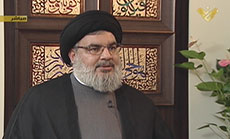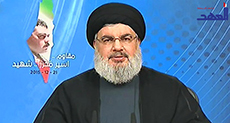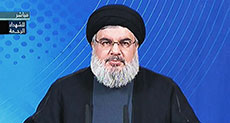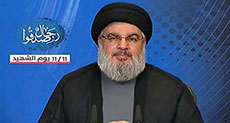
Sayyed Nasrallah: Al-Saud to Be Defeated in Yemen, War on Syria Failed

Local Editor
Hizbullah Secretary General His Eminence Sayyed Hassan Nasrallah predicted Monday that Saudi Arabia will suffer a "major defeat" in the Yemeni conflict, as he stressed that "the war on Syria" has failed.

In an interview with al-Ikhbariya Syrian news channel, Sayyed Nasrallah confirmed that "Saudi Arabia will suffer a major defeat that will have an impact on its domestic situation and the entire region."
He noted that the Saudi-led airstrikes have "miserably failed" to change the situation on the ground in Yemen, pointing out that the Huthi rebels and their allies are still advancing.
"The Yemenis were going to turn their country into a state qualified for being alongside the resistance movements in the region," said Nasrallah, referring to the Huthis' lightning power grab that preceded the Saudi-led intervention.
"The Yemeni people support the Palestinian cause and they were interacting with what's going on in Lebanon, Palestine and Syria. Today, there is a Saudi-American aggression against Yemen," he added.
When asked about claims of Iranian occupation of Syria, Sayyed Nasrallah said that the first to talk about an occupation was Saudi Arabia because the kingdom did not acknowledge the will of free peoples.
This is a "problem in the mentality of the Saudi regime." They claim that Iran occupied Syria, in the same way they claim Iran occupies Yemen, he said.
But "there is no Iranian military presence in Syria."
He reiterated his belief that the Yemen war was motivated by Saudi Arabia's desire to reclaim control over the country. The kingdom also wanted to intervene in Yemen because Sanaa was moving toward full independence, he said.
Turning to the situation Syria, the Resistance Leader highlighted that "the war on Syria has failed."
Asked whether the conflict in Syria was a religious or political one, His Eminence mentioned "a lot of friendships, alliances, animosities and wars have political motives and objectives but many people take advantage of religion to justify wars."
He also noted that the decision to enter the conflict was taken by Hizbullah's leadership, not by the party's ally Tehran.
"We chose to enter the war in Syria. We declared that, mentioned the reasons and joined with our own will," he said.
"In Lebanon, we didn't tell our allies in order not to embarrass anyone. After we engaged in the war, I apologized to our friends in Lebanon and told them that they were not consulted so that they don't share the consequences," he added.
"From the very beginning, we knew that our battle in Syria will be long and tough," he said.
Moreover, His Eminence clarified that the protests against the Syrian regime turned into an armed revolt due to a foreign scheme.
"It has been said a lot that Syria is being targeted because it is an essential component of the axis of resistance, but this is not the only reason.
"It has been said a lot that Syria is being targeted because it is an essential component of the axis of resistance, but this is not the only reason. The other reason, which might be more important, is that Syria was a state with an independent decision throughout the past decades ... If we want to find an independent state in the region, Syria is one of the few independent states in the region," he added.
Describing Syria as "an essential country in the region," Sayyed Nasrallah said one "cannot speak of the future of the region -- Turkey, Jordan and Iraq -- without Syria."
"Turkey, Saudi Arabia and Qatar launched ties with President Bashar Assad after the death of his father with the aim of usurping the Syrian decision," he said.
Recalling the 2005 assassination of former Lebanese Prime Minister Rafik Hariri, Sayyed Nasrallah said the fingers were "immediately" pointed at Syria after the assassination as part of a foreign scheme against it.
"The assassination was part of the scheme, which was continued through the 2006 war with the aim of destroying the resistance," His Eminence said, referring to the devastating summer war between Israel and Hizbullah.
"Al-Assad was open to dialogue with all figures when the Syrian revolution started, but when some countries sensed Assad's openness, they launched the armed action," Sayyed Nasrallah clarified.
He underlined, however, that "the war on Syria has failed."
"As long as the state exists, this means that the war has not succeeded or achieved its real and main objective. The main regions are still under the regime's control, such as the capital and the main cities," SaNasrallah added.
"Seizing areas such as Idlib, Raqa, Ghouta or Deir Ezzor will not achieve their objectives," he went on to say.
As for a possible political solution for the bloody conflict, His Eminence said that "what's needed in Syria is the resilience of the state and the army and keeping the doors open for any political dialogue that serves Syria."
"Any chance for a dialogue with any gathering should not be missed," he said.
Moreover, His Eminence mentioned said: "A nuclear agreement between Iran and world powers will strengthen Tehran's role in the region and rules out the specter of a regional war."
"There is no doubt that the Iranian nuclear deal will be big and important to the region," Sayyed Nasrallah said, noting that "the agreement, God willing, rules out the specter of regional war and world war."
"Iran will become richer and wealthier and will also become more influential. This will also reinforce the position of its allies."
"A stronger and wealthier Iran in the coming phase will be able to stand by its allies, and especially the Palestinian resistance, more than at any other time in history," he said.
""Israel's" rejection of nuclear talks between Iran and world powers, in light of a framework agreement announced last week, and Saudi Arabia's implicit opposition to it, reveals the importance of these talks," he said.
"There is no doubt that an agreement will have repercussions on the region," he said.
He said the possibility of "Israel" bombing nuclear facilities in Iran has become unlikely. Second, the agreement has ended Iran's isolation.
Sayyed Nasrallah said that negotiations have also revealed that talks are not linked or related to developments in the region. "The Americans had insisted on bringing regional issues to the negotiation table, but the Iranians refused," he said.
Source: News Agencies, Edited by website team
Comments


